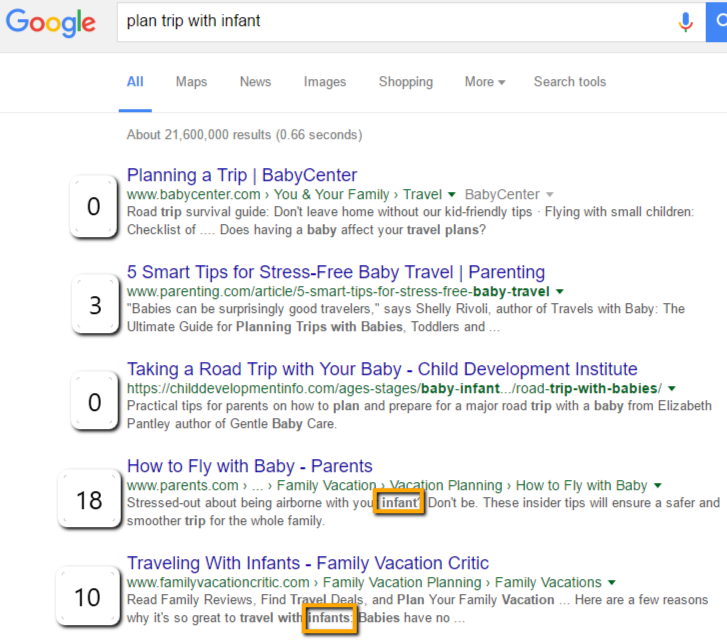Online marketing is largely dependent on a website’s content. Whether you are optimizing the site for organic traffic or running paid social or SEM campaigns, the content remains the centerpiece. And while a lot of things depend on content, the content itself heavily relies on the keywords and the topic you select.
Keyword research not only helps content rank higher on the search engine results pages for the right keywords, but it also dictates the structure of the content. This is another crucial aspect of producing high-quality content that engages users with a good user experience and valuable information that meets their search intent.
In this article, we take a look at 6 very common keyword research mistakes that many content marketers, SEOs, and website owners make unintentionally. It is important to identify these common mistakes and make sure you do not make any of them the next you conduct keyword research.
1. Conducting keyword research without creating buyer personas
The creation of buyer personas is often one of the first steps before online marketing and content writing starts. However, many website owners and content marketers start their content & SEO process before buyer personas are finalized.
That’s a mistake.
Buyer personas guide you during keyword research. They help you select target keywords and phrases for which you create content. Without understanding your audience, their challenges, problems, needs, and goals, you cannot the content marketing results you need.
Learn how to create buyer personas for keyword research and content marketing campaigns.
Once you create buyer personas, search the web to get a feel of which keywords and keyword phrases your target audience is using. You are recommended to use websites such as Quora, Reddit, Answer the Public.
The last website, answer the public, is also a great tool to find relevant long-tail keywords for your keyword research. Let’s discuss more about it.
2. Not focusing on long-tail keywords
Another common mistake that most newbie keyword researchers and content marketers make is that they do not focus enough on long-tail keywords.
Long-tail keywords are keyword phrases with usually three or more words. Compared to broad keywords, long-tail keywords have a relatively low search volume, but they are also less competitive keywords that can be easier to rank for.
During your keyword research, make sure to set aside some time to thoroughly research relevant long-tail keywords. Here are a few ways to do that:
- Use Google’s autosuggestions to see what other people are searching.
- Use Google Related Searches at the bottom of the search engine result page to find more long-tail keywords.
- Use websites such as Answer the Public to find plenty of long-tail keywords.
Long-tail keywords are especially useful for top-of-funnel topics.
3. Only focusing on long-tail keywords
The opposite end of the spectrum in which you solely rely on long-tail keywords and completely ignore broad keywords is also dangerous.
When conducting keyword research, it is important to find a nice balance between the two strategies. Generally, you should include both long-tail keywords and broad keywords in your keyword research strategy.
In today’s SEO world, everybody recommends targeting long-tail keywords. Consequently, targeting broad keywords has become kind of a taboo, but that should not be the case.
Google wants to promote websites that display authority and thought-leadership in the entire niche. That is only possible if you also target broad keywords, but there should be a strategy for it.
The best approach is to follow the pillar-and-cluster strategy to cover as much ground as possible. Here is a brief summary of how this strategy works:
- You select a broad keyword (topic) to target and create a massive, long-form pillar content for that broad keyword.
- Then you do some more keyword research and find several long-tail keywords that are relevant to the aforementioned topic.
- Suppose you find 10 long-tail keyword phrases that are directly relevant to the broad topic. You will need to create 10 blog posts on those subtopics, each targeting one long-tail keyword phrase.
- You then create internal links from each cluster post to the main pillar content and vice versa.
Here is a graphical representation of this strategy:
HubSpot used this exact strategy and experienced better views and higher search engine rankings.
4. Not analyzing competitors

Are you thoroughly analyzing competitors before and during keyword research? If not, that’s a big mistake that could cost you valuable search engine rankings.
Competitor analysis is an integral part of online marketing research — especially when you are selecting keywords that will make the foundation of your content and SEO strategy.
There are a few different angles that you should cover during competitor analysis:
- Identify which keywords your big competitors are successfully targeting and optimizing.
- Identify your competitors’ search engine rankings for important keywords.
- Identify the pieces of content that help them rank for the most important keyword phrases.
This strategy can help you identify quick wins and the keywords that you should be targeting to dethrone competitors and grab their market share for organic traffic. SEMRush’s Keyword Gap tool is a good tool to quickly analyze competitors and their position in the SERPs for important terms and keywords.
5. Neglecting the SERPs
While keyword research tools are important parts of the puzzle, it is equally crucial not to ignore the actual search engine results pages (SERPs).
By looking at the actual SERPs, you can gain information on the following:
- You can understand the searcher’s intent.
- You can identify what the search engine actually thinks of a keyword and what type of results it produces for the user.
- You can identify the type of content that search engines are prioritizing for a specific keyword phrase, e.g., a blog post, a product page, a PDF, etc.
- You can also note how the top-performing competitors are creating the meta titles and meta descriptions that help them get and stay at the top of the SERPs.
6. Overestimating the value of exact match keywords
Exact match keywords do have a place in your keyword strategy. However, they are not the be-all and end-all of keyword research.
Search engines have evolved over the years. Now, they are smarter and more contextual in nature — especially with the introduction of core algorithm updates, such as Google BERT.
Often times, a search engine does not need an exact keyword match to display a specific web page to a search engine user. Take a look at the following example.
The above screenshot shows a search query “plan trip with infant.” However, 2 of the top 3 results do not even use the word “infant” on their web page. On the other hand, pages that use this keyword 18 and 10 times are on numbers 4 and 5, respectively.
This proves the importance of relevant and LSI keywords. Most importantly, it highlights the importance of matching searcher intent.
Learn more about LSI keywords.
Conclusion
Keyword research can be a complex task. It is easy to make mistakes while researching keywords; these mistakes can prove costly as you create content, acquire backlinks, and do SEO for pages with keywords that might not be best suited to your website or target audience.
Use this article the next time you search keywords and make sure you are not making any of the six mistakes mentioned above.
